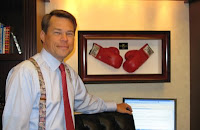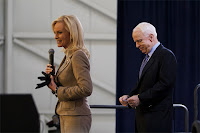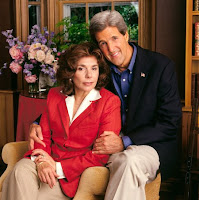
It’s been an eventful couple of days here in radio land.
*
Mel Karmazin got his way with the Sirius-XM merger and wasted no time in making personal appearances on both Howard Stern and Opie and Anthony to rub National Association of Broadcasters head hen David “Fumbles” Rehr’s face in his inadequacies.
Mel Karmazin got his way with the Sirius-XM merger and wasted no time in making personal appearances on both Howard Stern and Opie and Anthony to rub National Association of Broadcasters head hen David “Fumbles” Rehr’s face in his inadequacies.
One can only imagine what the record company’s goon squad – the RIAA – plan to do with what’s left of Fumblina.
How many tire tracks are up and down your back now, Fumbles?
 The herd is being thinned at the new BainCapital-Thomas H. Lee privatized Clear Channel.
The herd is being thinned at the new BainCapital-Thomas H. Lee privatized Clear Channel.Some are leaving on their own free will with five figure stock options in tow while others are being involuntarily escorted from the premises.
You have to love the sincere sound bite from child of privilege and Clear Channel CEO Mark Mays, “We are deeply grateful to our loyal employees who have remained focused and generated terrific results through their hard work and dedication.”
Question – How many Clear Channel employees does it take to change a light bulb?
Question – How many Clear Channel employees does it take to change a light bulb?
Answer – Both of them.
It may be a new company but it looks like it’s still run by the same old tight-fisted, fishy-eyed, cold-hearted thieves that wouldn’t help a blind child across the street unless they got a time buy for it.
It may be a new company but it looks like it’s still run by the same old tight-fisted, fishy-eyed, cold-hearted thieves that wouldn’t help a blind child across the street unless they got a time buy for it.
 No one will ever deny that Clear Channel didn’t have a major impact on radio. It’s just not the one they expected. Everyone turned them off.
No one will ever deny that Clear Channel didn’t have a major impact on radio. It’s just not the one they expected. Everyone turned them off.Ken Dardis said it best in Audio Graphics yesterday, “Clear Channel is now privately-owned so, from this perch, expectations are that it will continue perfecting its mediocrity online and off.”
I believe the only chance of the new Clear Channel’s survival is to split itself into two divisions, one good and one evil, which will then battle for what’s left of radio domination.
The new Clear Channel is, however, obligated to spin off roughly seventy-five stations into that Aloha Station Trust to fulfill FCC ownership caps.
Markets include Los Angeles (2 stations), Austin (1), New Orleans (7), and San Jose (3).
One station they can’t wait to unload is KCJB in Minot, North Dakota – one of six on the block in that market.
KCJB is forever ingrained in radio history as Clear Channel’s first “Ooooops” station.
Being a dual formatted country music and news-talker, KCJB was the designated emergency station for the market.
Then came that emergency on a cold January morning in 2002.
 A freight train went off the rails, puncturing cars carrying anhydrous ammonia fertilizer. It formed into a burning white cloud of toxic chemicals. Wind pushed it toward a populated area.
A freight train went off the rails, puncturing cars carrying anhydrous ammonia fertilizer. It formed into a burning white cloud of toxic chemicals. Wind pushed it toward a populated area.Hearing the crash and seeing the cloud, residents turned to KCJB for information – but the station was carrying a satellite feed from another market.
Police responding to the accident tried to contact someone at KCJB – but there was no stink of human at the station.
Their negligence resulted in one death and three hundred injuries.
Later, Clear Channel attempted to pin the blame on the local police, accusing them of not understanding their Emergency Alert System (EAS). They also claimed there was someone on-duty after all at the station during the time of the accident.
Their excuses were negated when other markets weighed in. Reports were compiled on Clear Channel news and information shortcomings and bloopers involving blizzards, storms, accidents, and disasters from all over the country.
Those were the days when if you asked Clear Channel the time they would tell you how to break the watch.
But that was yesterday and now all is forgiven.
 You should’ve seen the Mays brothers, Hogan, and the BainCapital-Thomas Lee boys sitting around the campfire on South Basse Drive last night singing “Kumbaya.”
You should’ve seen the Mays brothers, Hogan, and the BainCapital-Thomas Lee boys sitting around the campfire on South Basse Drive last night singing “Kumbaya.”When the sell-off deal was put together in 2006, Clear Channel assumed it would get between $1.1 billion and $1.4 billion. But now with properties worth far less than they were two years ago, the Bain-Lee Clear Channel won’t see a number even close to that dream on figure.
It will be a new spectator sport. Watch them claw after every red cent.
Then there was the confirmation of the worst kept secret in the radio industry when CBS announced that it had put approximately “another fifty medium market stations” up for sale. CBS Radio-TV CEO Les Moonves implied that deals could be announced in thirty days.
 Does that have anything to do with the NAB convo in Austin?
Does that have anything to do with the NAB convo in Austin?Maybe CBS Radio wants to go retro and revisit to the go-go days of the late 90s and early 2000 when radio heads would vie for the title of "cat that ate the most canaries;" using that NAB backdrop to announce their latest multiple station acquisition?
Markets CBS has on the block include Portland (6 stations), Pittsburgh (4), Charlotte (7), Riverside (4), Sacramento (6), Cleveland (4), Vegas (6), and Orlando (3).
Some believe the announcement was tossed out to divert attention from the real story - CBS Radio revs plummeted 10 percent, from $463.4 million to $416.4 million and operating income crashed - down 16 percent from $179.4 million to $150.7 million.
 Does CBS plans to peddle the stations off at Filene’s Basement closeout sale?
Does CBS plans to peddle the stations off at Filene’s Basement closeout sale?Of course, there’s that nagging question again on how one values a radio property in 2008.
*
King Midas in reverse is my guess.
As one radio executive put it to me this morning:
“First, prospective owners are going to have to find someone willing to loan them a pile of dough. Although the pile needed is shrinking daily. Still, it's tough in the credit market right now, which will both slow Clear Channel and CBS as they try to unload their losers, and, when they do find buyers, will put them at a decided negotiating disadvantage.
“For those of you paying attention, a number of us have been saying this day would inevitably come since the beginning of consolidation. A shame thousands of people had to lose jobs and careers to make a couple of dozen people very, very rich. Oh yeah, and they managed to pretty well eviscerate an entire industry in the process. Neat. A twofer!”
As one radio executive put it to me this morning:
“First, prospective owners are going to have to find someone willing to loan them a pile of dough. Although the pile needed is shrinking daily. Still, it's tough in the credit market right now, which will both slow Clear Channel and CBS as they try to unload their losers, and, when they do find buyers, will put them at a decided negotiating disadvantage.
“For those of you paying attention, a number of us have been saying this day would inevitably come since the beginning of consolidation. A shame thousands of people had to lose jobs and careers to make a couple of dozen people very, very rich. Oh yeah, and they managed to pretty well eviscerate an entire industry in the process. Neat. A twofer!”
 I’ll bet the corner loan shark will offer a more reasonable rate than the vig a legit lender will charge on a radio purchase deal.
I’ll bet the corner loan shark will offer a more reasonable rate than the vig a legit lender will charge on a radio purchase deal.I think the best solution for both Clear Channel and CBS in selling off their properties is to bundle them together and create their own country. Then they can declare war on the U.S., lose – and live off the war reparations. They’ll probably get a better deal that way than trying to peddle ‘em off on the open market.











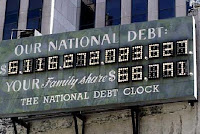




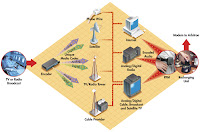





 Gray hairs
Gray hairs



